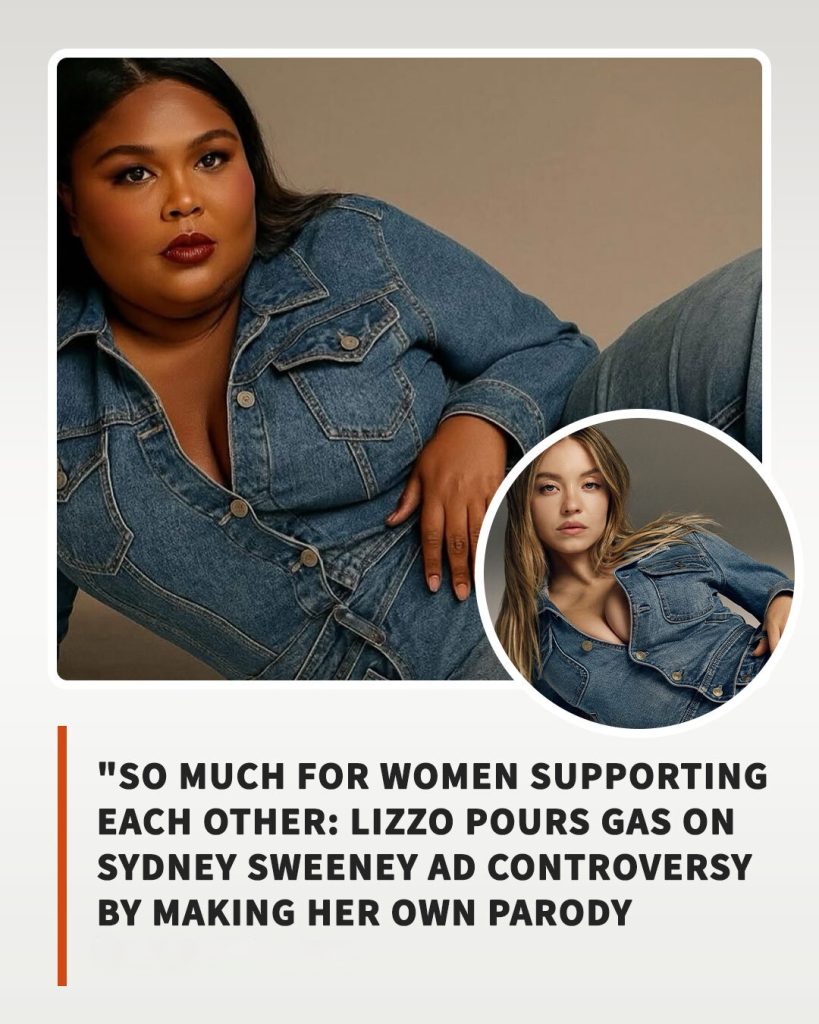With the internet suddenly buzzing about genetics, Lizzo has entered the conversation with her own take on the controversy surrounding American Eagle Outfitters’ latest ad campaign featuring actress Sydney Sweeney.

The campaign, touted as the brand’s most expensive to date, faced heavy criticism for allegedly glorifying whiteness and promoting a narrow, exclusionary beauty standard. Social media users and critics accused it of being tone-deaf and even likened it to “ethnic cleansing” in its aesthetics. The backlash quickly escalated as celebrities began chiming in, including Lizzo—who offered both commentary and parody.
The Grammy-winning singer posted a meme that mirrored Sydney Sweeney’s campaign photo almost exactly. Wearing a similar outfit and striking a nearly identical pose, Lizzo recreated one of the now-infamous American Eagle ads, this time with a twist. She added a bold caption that read, “My jeans are Black,” clearly playing off Sweeney’s line from the campaign: “My genes are blue.” The difference wasn’t just in spelling; Lizzo’s version spoke to race, representation, and inclusivity.
In another post, Lizzo shared a photoshopped image of herself with a caption that read, “If the Democrats won the election,” jokingly implying that under different leadership, perhaps she would’ve been chosen as the face of the brand’s campaign. The satirical post came just as Lizzo was promoting her interview with Paper magazine, where she discussed her self-image and personal connection to beauty. “I love my natural face,” she said. “I look at my mother’s face and I’m like, hell yeah. I feel very blessed to have great genes and I wanna show it.”
@dojacat
my jeans are blee
She elaborated further, comparing her skin to a luxury item. “Why cover up what God gave you? People with beautiful skin sometimes take it for granted. When you buy a nice bag, you don’t throw it around—you care for it. One day it’s gonna age, and you’ll think, ‘Oh no! This bag is dusty.’ That’s when I realized: I’ve got good skin, but it can be better.” Lizzo added that she only started taking her skincare seriously about three years ago. “Before that, I was just a rose water and oil kinda girl. That was it—done.”
Her comments directly countered the message from American Eagle’s original campaign, in which Sydney Sweeney credited her appearance to genetics, saying, “Genes are passed down from parents to offspring, often determining traits like hair color, personality, and even eye color… my genes are blue.” The ad featured Sweeney in a clean white top, with blonde hair styled to perfection, symbolizing a certain kind of idealized beauty that left many feeling excluded.
Lizzo wasn’t the only celebrity to mock the ad. Doja Cat joined in, roasting the campaign by mimicking Sydney’s dialogue in an exaggerated Southern accent. Meanwhile, comedian Michael Pavano offered his own spoof, donning purple denim and a platinum blonde wig. “My jeans are blue—so they’re better than yours,” he joked. “They say people with blonde hair and blue eyes are naturally favored. I don’t say it, but they do—and I believe it.”
Late-night host Stephen Colbert also used the controversy as comedic fuel. On The Late Show, Colbert poked fun at how far the criticism had gone. “Just like Sydney Sweeney, I too carry the gene for sultry, commercial-worthy scratchy voice,” he quipped. “Got it from my uncle on my mother’s side.” Addressing claims that the ad promoted eugenics and white supremacy, he added, “That might be a bit of an overreaction—although Hitler did briefly model for Mein Kampfort Fit Jeans. How do you say ‘badonk’ in German?”
The jokes and parodies highlighted just how seriously people took the ad’s implications. At a time when cultural inclusivity and representation are under intense public scrutiny, the campaign’s narrow depiction of beauty struck a nerve. Critics argued it reinforced outdated standards while failing to represent a broader spectrum of humanity.
To make matters worse, shortly after the American Eagle backlash, Dunkin’ launched its own campaign that also leaned heavily on the “genetics” theme. This time, the face of the ad was actor Gavin Casalegno, known for his role in The Summer I Turned Pretty. The Dunkin’ campaign featured Gavin as the self-proclaimed “king of summer,” sipping on a Golden Hour Refresher. “I didn’t ask to be the king of summer,” he said. “It just kinda happened. This tan? Genetics.” He added with a wink, “I just got my color analysis back. Guess what? Golden summer, literally.”
Social media users quickly pointed out the similarities between the two campaigns. “Are AE and DD using the same agency or something?” one person commented. Another asked, “Why are ads suddenly so obsessed with genetics?”
These overlapping controversies have sparked larger conversations about marketing ethics, racial undertones in advertising, and how brands shape narratives around beauty and identity. In a cultural climate where consumers are more discerning and socially conscious than ever, these tone-deaf campaigns have not only backfired—they’ve become viral cautionary tales.
Lizzo’s parody and subsequent interview weren’t just humorous; they were also a powerful reminder that representation matters. Her use of satire to challenge beauty norms resonated with many, especially those who’ve long felt excluded by mainstream advertising. By embracing her “great genes” and unapologetically celebrating her natural self, Lizzo has turned a controversial moment into a cultural conversation—and perhaps even a wake-up call for the marketing world.





